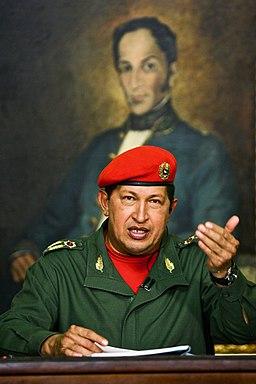
Venezuela is bankrupt, having just defaulted on three interest payments. And much of the world is pointing fingers at the socialist policies of Hugo Chavez and those of his successor, the incumbent Nicolás Maduro. This laying of the blame is not wrong but it is incomplete.
The kindest thing you could say about Mr. Chavez is that he was a talented demagogue who brilliantly identified his opportunity and judiciously seized his moment. But, as previously argued by Fred McMahon of the Fraser Institute, Chavez did not start Venezuela’s downward spiral. He was instead one of the final acts in the country’s decades-long devolution from laissez-faire capitalism to cronyism and finally to socialism. Cronies undermined Venezuela’s economy for decades and opened the door to Chavez’s socialism.
McMahon explained last year:
Venezuela, like much of Latin America, was afflicted by crony capitalists, who detest free markets as much as crony socialists, and degraded free markets long before Mr. Chavez.
Cronyism restricted markets, weakened the rule of law, undermined growth, adopted many leftist “populist” policies to maintain power and favoured their supporters at all income levels, excluding others and generating the frustration that led to Mr. Chavez.
In the same vein, we argued previously that cronyism is a bridge from laissez-faire to socialism.

Measured by the Fraser Institute’s Economic Freedom Ranking, Venezuela ranked 10th in the world in 1970 but it had slipped to a ranking of 109th by the time Chavez became president in 1999. Of course, he and his successor made the crony problem even worse, as socialists everywhere have a habit of doing, and Venezuela ranked 159th or dead last of all ranked countries in 2015.
Some of the decline that started in 1970 is explained by Venezuela’s growing oil revenues. The great leap in the price of oil made the economy increasingly extractive and exclusive. Great wealth came more easily to rent-seekers with the right connections in government and business than to those who deserved it by dint of entrepreneurial merit.
There is a warning here for other countries. In 1970, the United States was ranked 4th on the Fraser index. By 2015, it had dropped to 11th. If this moderate step down is not too worrying at first blush, it may be because cronyism has become a problem in nearly all countries after a prolonged boom in the real estate, telecom, energy, law, finance and other extractive sectors. If it could be measured in absolute instead of relative terms, the US drop would probably look significantly more pronounced.
President Trump and his entourage speak the language of capitalism but they arguably constitute the most glaringly cronyistic administration in memory. In theory therefore, we could now be in a transition that opens the door to the presidency of Bernie Sanders or one of his political heirs.
See the Fraser Institute’s Economic Freedom Rankings from 1970 to today.
This piece originally appeared on Populyst.net
Sami Karam is the founder and editor of populyst.net and the creator of the populyst index™. populyst is about innovation, demography and society. Before populyst, he was the founder and manager of the Seven Global funds and a fund manager at leading asset managers in Boston and New York. In addition to a finance MBA from the Wharton School, he holds a Master's in Civil Engineering from Cornell and a Bachelor of Architecture from UT Austin.
Photo: Karel Fuentes [Public domain], via Wikimedia Commons













Stop the conflation
Stop conflating Bernie and Hugo.
They are not the same in kind.
They are not even close in degree.
I am not a Bernie supporter, but this hate-mongering, from you and others, that electing someone in the USA who espouse some socialist beliefs will result in the USA becoming similar to Venezuela is utter bullshit.